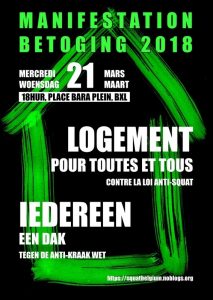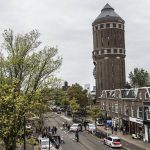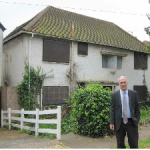 Since the 1960s, squatting has been going on in the Netherlands. Since then, the housing shortage has only increased. And so it is still being squatted. You could call it a contrary tradition. Today, too, but today we make ourselves extra visible.
Since the 1960s, squatting has been going on in the Netherlands. Since then, the housing shortage has only increased. And so it is still being squatted. You could call it a contrary tradition. Today, too, but today we make ourselves extra visible.
Why?
In opposition to the recently tabled amendment proposal for the Squatting and Vacancy Act.
Although the above mentioned law already came into force in 2010 and squatting became illegal, some politicians want to make the illegal use of housing even more illegal. The proposal is to make emergency evictions, including emergency lawsuits, the norm within a time frame of 3 days.
This seems superfluous, because at the moment, too, homeowners have sufficient resources at their disposal to be able to evacuate squatters. [Read More]
Amsterdam: Squatting goes on!
Netherlands: National day of action against the ban on squatting
Since the 1960s, squatting has functioned as a mean of action to stress out a failing housing and vacancy policy: the reason why for decades a squatting ban was regarded as undesirable without any associated effective measures to prevent vacancy. Although squatting has been banned by law since 2010, vacancy and housing shortage have doubled in the past 10 years. And so people are still squatting. The VVD and the CDA do not see vacancies and housing shortages as a problem, but squatting is. At the moment, these parties are working hard for a change in the law to ensure that squatters can be evicted more quickly, without tackling the underlying problems. Because this law will put the legal position of squatters and precarious residents under severe pressure and will only further increase the historically high vacancy rates and homelessness, actions are taking place in various parts of the country today.
One-sided effectuation Squatting and Vacancy Act
Almost 10 years ago, the Squatting and Vacancy Act was passed, on the condition that not only squatting, but also vacancy had to be reduced. Whereas squatting has always been (and still is!) an important stick behind the door of pawnbrokers, from now on municipalities should play a more active role in tackling speculation on vacant property and impoverishment. Fines for structural vacancy, however, have hardly been imposed and thanks to the gigantic boost of vacancy management/property guardianship, it has only become easier for speculators to conceal vacancy under the guise of ‘occupancy through temporary renting’. [Read More]
Netherlands: Stop the new law against squatting!!!
 Squatting is not the problem, but the solution…..!!!!
Squatting is not the problem, but the solution…..!!!!
The new bill on squatting has no added value whatsoever. Since the Squatting and Vacant Property Act came into force in 2010, the squatting of homes and business premises has been reduced enormously. People who want to squat are frightened by the sanctions that are imposed if caught in the act. Owners have a large number of options to bridge any temporary vacancies by registering or by hiring anti-squat companies.
It is precisely the massive deployment of vacancy management by owners that has made squatting considerably more difficult. Owners also have a legal option to have a squatted property to their disposal again. At least, provided they have adequate concrete plans for that building. It is this legal intermediate step that makes it clear whether owners speculate on properties or not. In that sense, squatters have always had a signal function. This important function disappears with this new law.
Squatting is already complicated enough for squatters under current legislation. Practice shows that most buildings remain squatted for less than 3 or 4 months. Squatters who have been working on this for a number of years often have to give up after such a period because it is difficult to constantly have to leave under pressure and start something new. The current practice and law is therefore really no problem for owners. They usually only lose the use of their property for a short period of time. [Read More]
Utrecht: Protest action against new anti squat law
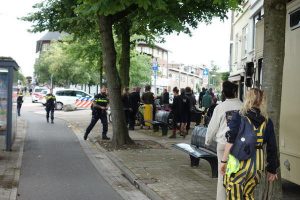 Today, there was an attempt to resquat the Watertoren on the Amsterdamsestraatweg in Utrecht. This water tower has been squatted many times already. Today, squatters unfortunately failed. The water tower, a designated national monument, has not been in use since 1986. The real estate developer who bought it in 2014, has not succeeded yet in developing anything. At the same time, alternative uses are not tolerated and eviction for emptiness has been the systematic answer. This while the monumental building is falling into disrepair.
Today, there was an attempt to resquat the Watertoren on the Amsterdamsestraatweg in Utrecht. This water tower has been squatted many times already. Today, squatters unfortunately failed. The water tower, a designated national monument, has not been in use since 1986. The real estate developer who bought it in 2014, has not succeeded yet in developing anything. At the same time, alternative uses are not tolerated and eviction for emptiness has been the systematic answer. This while the monumental building is falling into disrepair.
Today’s squatting action was intended as a protest against the plan of the CDA and VVD to tighten up the law against squatting. The aim of the 2010 law was to tackle both squatting and vacancy. In recent years, squatters have been the main target of prosecution, while only a few cities have been acting against emptiness. The new proposal gives squatters hardly any time and space to defend themselves. The right of residence of people who take matters into their own hands, is so further eroded. [Read More]
Brussels: Demo march 21. A roof for everybody!
Because the housing crisis can not be ignored. There are between 15,000 and 30,000 empty dwellings in Brussels, while there are around 4,000 homeless people. 40,000 families are on the waiting list for social housing, with waiting times varying between 8 and 12 years. Lastly, rents on the private market have steadily increased in recent years. As a result, households whose incomes do not exceed € 1500 have to average 60% of their budget to rent.
Because, in spite of this context, the government has passed an anti-squat law, which puts people in risks to go to jail for squatting empty houses to sleep in.
Because this law appears in a general movement of repression: the constant criminalization of the undocumented and the individuals who are in solidarity with them, the installation of surveillance cameras in the streets, the police and military presence in the public space are as much clues to a desire for global control.
Because applicable solutions exist (right of requisition, right of public management, …) or have been proposed incessantly by associations for the right to housing (consequent increase of the number of social housing, framing of the rents …).
The authorities refuse to apply them.
As for us, we continue to squat, we continue to protest!
For the demo to be enjoyable for all participants, take care of the ones and avoid unconscious or oppressive behaviors.
Wednesday 21 march,2018 – 18:00, Place Bara – Baraplein, Brussels
nonalaloiantisquat [at] riseup [dot] net
https://squ.at/r/4jg5
https://squatbelgium.noblogs.org/post/manif/
Gent (Belgium): Kraaiennest, new squatted social center
On 15 february 2018, a few hundred people were demonstrating in Gent against the squatting ban. They ended up occupying a big empty building for people in need of housing. The banner on the squatted building is stating: “What is not allowed is still possible“. From 23 till 25 February, the action weekend against the squatting ban will take place in Gent. This new social center is called Kraaiennest. More events in Gent are to be found on Chiropractor.
Sociaal Centrum ‘T Kraaiennest
Brabantdam 33, 9000 Gent, Belgium
kraaiennest [at] riseup [dot] net
https://kraaiennest.noblogs.org/
https://squ.at/r/4bke
Belgium: Call to demonstrate against the anti squat law. International call out for solidarity
 Call to demonstrate against the anti squat law, against the war of the poor – Thursday 15 February 2018 – 19:00 – BLANDIJNBERG – GENT
Call to demonstrate against the anti squat law, against the war of the poor – Thursday 15 February 2018 – 19:00 – BLANDIJNBERG – GENT
On 3rd November 2017, a squat on Stapelplein in Gent was attacked. A family with young kids was living in a house, not to have to sleep in the park as they did before. A group assaulted them with sticks and fireworks. This was an act of racially motivated hatred against Roma. This hatred is fueled by a media campaign, spreading a lie from the owner. The house was left empty, and later nobody was living there.
On 26th November, a racist demonstration walked through Gent. In their own words, the mob took the streets “against injustice”, “against politics”. Slogans anti Roma were screamed during hours. In the prostitution district, sex workers were insulted. Homeless people at the Baudelopark shelter were also intimidated. This orgy of racism, misogyny, hatred towards the poor went on without meeting any resistance. Het Laatste Nieuws only titled a “demonstration against injustice” on their website. [Read More]
Utrecht: Watertower squatted to protest squatban, later evicted
Yesterday (October 1) a water tower in Utrecht (in the Netherlands) was squatted to mark seven years since the criminalisation of squatting. The long empty building (which was already squatted in the past) is a perfect example of the necessity to occupy empty buildings. A big banner was put on the building saying ‘Fuck the squatban.’ Unfortunately the state responded with overwhelming force and evicted the building the same day. According to reports, seven people were arrested, six squatters and one person outside for “insulting the police”. Solidarity with the arrestees!
Here follows a (quickly translated) statement from the squatters:
[Read More]
UK: The edge of precarity. Squatting in England and emergency crisis planning
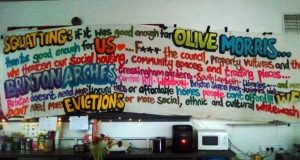 In recent decades squatting has been under near constant assault from a variety of ruling class actors. In 2012 the Conservative/ Liberal Democrat government banned squatting in residential properties for the purposes of living. Councils, Conservative and Labour alike, treat squatters as a public health issues and pressure property owners to fast track evictions. The (still) rising property market in London and other major cities has incentivised owners to use underhand legal techniques and increasingly violent tactics to rid their properties of squatters in order to make a quick sale or proceed with redevelopment works.
In recent decades squatting has been under near constant assault from a variety of ruling class actors. In 2012 the Conservative/ Liberal Democrat government banned squatting in residential properties for the purposes of living. Councils, Conservative and Labour alike, treat squatters as a public health issues and pressure property owners to fast track evictions. The (still) rising property market in London and other major cities has incentivised owners to use underhand legal techniques and increasingly violent tactics to rid their properties of squatters in order to make a quick sale or proceed with redevelopment works.
In spite of this, squatting continues. A Houses of Parliament report on evicting squatters estimated there to be around 20,000 squatters at any one time in the UK. This is certain to be a conservative estimate considering the tens of thousands of hidden homeless and the tendency among squatters to float between squatting and other forms of precarious housing arrangements such as guardianships, pubwatching and renting.
Squatting goes on, but in a much diminished form. Nearly all capacity for establishing any kind of long term infrastructure has been destroyed. In the past, semi permanent spaces have been places for squatters to organise, relax, recuperate and party. More than most, squatters depend on solidarity and mutual aid to survive. In Amsterdam squats can last for years. Joe’s Garage, for example, is a social centre near the centre of Amsterdam which has been squatted for 12 years and hosts gigs, talks and people’s kitchens. Social centres and creative spaces act as community hubs that people incorporate into their everyday lives and routines and provide points of stability that can be relied on.
When evicted squatters move to nearby squats to rest and make plan to rehouse themselves, vans are found to move possessions, eviction resistances are put together initially through networks of friends. The demise of squat infrastructure has made it harder to get these things done. It is difficult to keep track of your mates if they move every few weeks. It’s even harder if your time and energy is taken up with moving yourself and your crew.
Sudden court dates, unexpected illegal evictions and the like have inculcated a heightened capacity for emergency crisis planning, at least in the London squat scene where I have experience. Less time for social events and collective actions has meant squatters tend to see the most of each other in stressful situations like evictions, or raves. More often than not squatters just end up seeing less of each other, a diminishing of the social network they rely on to survive.
There have been attempts to combat this trend. Last year an old bank on Deptford High Street was squatted and hosted regular collective meals and other open events such as info nights. This was encouraging and saw frank articulations of politics and lived experiences between squatters and non squatters. The bank squat lasted a couple of months and the crew kept up events in a new building. Inevitably, however, some people not clued into the squatters social circle were left behind in the move, either because they did not know where the new building was or did not have the means to easily get there.
Squatting will continue as long as the housing crisis continues, as long as people are forced to the margins of society. The reorientation away from crisis planning and towards long term organisation, towards new infrastructure, will take time and will require different strategies and efforts. It is time for the left to end its sneering dismissal of the squatter movement – to stop instrumentalising squatters whenever they need them for a political action or occupation only to forget about them when they are no longer needed. Squatting is part of a spectrum of precarious housing and living that needs to be contested and should be more integrated into struggles for council housing, direct actions against estate agents and organising among couriers and other ‘gig economy’ industries.
https://freedomnews.org.uk/the-edge-of-precarity-squatting-in-england-and-emergency-crisis-planning/
Groups in London: https://radar.squat.net/en/groups/city/london
Events in London: https://radar.squat.net/en/events/city/London
Groups in UK: https://radar.squat.net/en/groups/country/GB
Events in UK: https://radar.squat.net/en/events/country/GB
Amsterdam: October 1st, Right to the City demo
RIGHT TO A SOCIAL HOUSING POLICY
The city belongs to all of us, including to the poor and to the refugees. The city council needs to focus on making the biggest medley so not only people or organizations with money, but everyone has a chance to settle at their place of choice. The heart of a city is essential part of making a city livable and therefore cheap rents for housing and shops should be preserved.
RIGHT TO COMMONALTY
A city exists out of neighborhoods. This should be neighborhoods made able by its inhabitants, neighborhoods where the grocery store, bakery and local tailor should have a place. Amsterdam is no brand, but a city where people cohabit. [Read More]
UK: Damned Lies and No Useful Statistics – The Criminalisation of Squatting in England and Wales
To tie in with the courtcase starting Monday in Brighton, when three squatters are going on trial under s144 and will not be pleading guilty, here’s some analysis of the criminalisation of squatting in England and Wales..
In 2012, as we all know, new offence of squatting in a residential building was created by the Government, following a moral panic in the media whipped up by a few right-wing politicians. After a rushed consultation, a last-minute clause was added to the Legal Aid, Sentencing and Punishment of Offenders Bill (LASPO) which meant that it was never properly discussed in the House of Commons. The bill was then pushed through the House of Lords at midnight. Section144 criminalises trespass in a residential building with up to 6 months in prison and/or £5000 fine. Previous campaigns to criminalise squatting in the late 1970s and mid 1990s had failed, unfortunately this time it partially succeeded.
UK: Anti-Squatting MP hosts DJ Fatboy Slim at Commons
The same MP who has tabled an Early Day Motion (EDM) that highlights the need for owners of commercial property to have the same rights as owners of residential premises when it comes to removing squatters has invited musician and DJ Fatboy Slim (aka Norman Cook) to play an unprecendented set at The House of Commons on the 6th March!!! Cook will be performing at Parliament’s terrace bar as the support act for the winner of “the House the House competition”, in aid of the Last Night a DJ Saved My Life Foundation, a charity which is aimed at getting young people involved in their communities.

